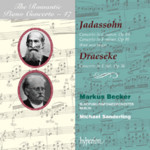
Piano Concertos
 $32.00
Special Order
$32.00
Special Order3 - 6 weeks add to cart
JADASSOHN / DRAESKE
Piano Concertos
Markus Becker (piano) / Rundfunk-Sinfonieorchester Berlin / Michael Sanderling (conductor)
[ Hyperion Romantic Piano Concertos Vol 47 / CD ]
Release Date: Saturday 28 February 2009
This item is only available to us via Special Order. We should be able to get it to you in 3 - 6 weeks from when you order it.
'These pieces, which burst with … memorable tunes and lashings of showy arpeggios, are played with admirable swagger by Markus Becker and are a welcome addition to Hyperion's exhaustive study of the Romantic Piano Concerto' (The Observer)
Having listened to the concertos on this disc, we might pause to ask ourselves what went wrong, why three perfectly respectable, expertly written and reasonably inventive pieces should have been relegated to the dustbin of history after the deaths of their composers? After all, it is not as if every more famous work is a model of perfection. The first movement of Brahms's D minor Concerto seems to go on for ever once the listener realizes with horror that its composer intends to recapitulate the entire exposition note for note, and the Piano Concerto by Edvard Grieg joins its memorable melodies together by the musical equivalent of string and sticking plaster. Grieg's teacher Jadassohn is, at least in this respect, a much more accomplished operator. Two possible explanations offer themselves, the one artistic, the other political.
For all their compositional adroitness, both Draeseke and Jadassohn lacked the ability to invent tunes that are immediately pregnant with musical possibility, and which obstinately lodge in the mind of the listener. The opening of Brahms's D minor Concerto is so unforgettably stunning that one is prepared to forgive a certain long-windedness in its subsequent treatment, while Grieg's Concerto is quite simply a cornucopia of catchy tunes. They may not be flawless pieces, but they are certainly not bland. Furthermore, to Draeseke's and Jadassohn's disadvantage, not only was their musical material less initially arresting, but their works were dealt an unexpected blow by history. As a German-Jewish composer, Jadassohn was quite deliberately suppressed in the Germany of the 1930s. After the Nazi period was over, his name was firmly engraved in the list of 'interesting historical figures' whose music was not well-enough known even to make a superficial judgment about its value. Draeseke's fate was more ironic. In stark contrast to Jadassohn's œuvre, his music was extolled by the Nazis as an example of 'pure German art'. Indeed, the 1930s saw a mini Draeseke-revival, largely fuelled by official encouragement rather than grass-roots enthusiasm. After 1945 the inevitable reaction took place. Draeseke's music was tainted with political associations for which the hapless composer was hardly responsible. Once more he became a forgotten man. Around a century after their deaths, this recording finally gives listeners the opportunity to come to their own judgment of both composers.
Tracks:
Salomon Jadassohn (1831-1902):
Piano Concerto No 1 in C minor, Op 89
Piano Concerto No 2 in F minor, Op 90
Felix Draeseke (1835-1913):
Piano Concerto in E flat major, Op 36



